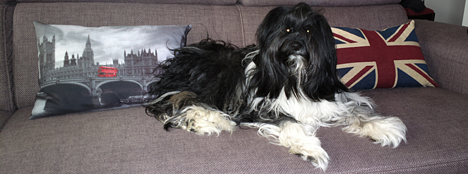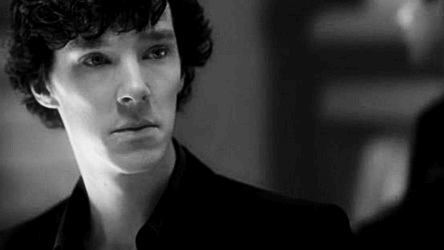
BBC Sherlock Fan Forum - Serving Sherlockians since February 2012.
- anjaH_alias
- Mycroft's Contact
 Offline
Offline - Registered: November 13, 2012
- Posts: 434
A question about CAM - from Bonfire night to HLV
I was wondering: Why did CAM put John in TEH into a bonfire? Was it because of Mary trying to get rid of him? Did she try this at that time already? Or better: Did he blackmail her already? And if so, why?
I assume meanwhile that he did that to her to get power about Mycroft. As he said: If you own Mary you own Mycroft (-> Mary -> John -> Sherlock -> Mycroft = pressure points). Is it this? Or did I overhear something? When did the whole story start and why?
If I am right it was all about Mycroft. In TEH I thought there is a common past of Mary and CAM - again a red herring then, which is also presented via telegram in ASoT.
Last edited by anjaH_alias (January 14, 2014 7:45 am)
- TeeJay
- On The Side Of The Angels
 Offline
Offline 
- From: Germany
- Registered: January 11, 2014
- Posts: 1,039
Re: A question about CAM - from Bonfire night to HLV
The way I understood it is that CAM needed leverage on Mycroft. And he achieved that via Sherlock, John and Mary, kinda like a chain reaction. You get to Mycroft through Sherlock, you get to Sherlock through John, and you get to John through Mary. Mary was leverage to get CAM what he wanted all along: Mycroft and his state secrets. And putting John in the bonfire was CAM's twisted way of seeing whether John would offer the leverage that he needed in order to have a weakness of Sherlock's to exploit. Come to think of it, perhaps it was a bit of a "test", because Sherlock had such a long list of pressure points, and CAM wasn't sure which one to use.
It all seemed so very elaborate, because I'm quite sure CAM was smart enough to find a way to use his pressure points without having to go through three different people (which leaves more margin for error and unpredictable events), but it sure made for a good TV plot. ![]()
Last edited by TeeJay (January 14, 2014 7:51 am)
___________________________________________
"Oh please. Killing me, that's so two years ago."
DominionFans.com
- anjaH_alias
- Mycroft's Contact
 Offline
Offline - Registered: November 13, 2012
- Posts: 434
Re: A question about CAM - from Bonfire night to HLV
This was exactly what I meant, that´s how I understood it. (I am sometimes very lazy - I knew that the word "leverage" was important, but I never looked it up ![]() - should have done that before). Thanx.
- should have done that before). Thanx.
Last edited by anjaH_alias (January 14, 2014 7:53 am)
- •
- zeratul
- Consulting Criminal
 Offline
Offline 
- From: Germany, NRW
- Registered: January 10, 2014
- Posts: 951
Re: A question about CAM - from Bonfire night to HLV
Well I think it is like he said. He wanted to prove that John is a pressure point of Sherlock. But he still needed John that's why he had people standing by.
Mary->John->Sherlock->Mycroft
________________________________________
It feels squishy! Is it supposed to feel squishy?

You’ve salted away every fact under the sun!
- SherlocklivesinOH
- Mycroft's Contact
 Offline
Offline - Registered: January 12, 2014
- Posts: 526
Re: A question about CAM - from Bonfire night to HLV
I realized when the bonfire thing first happened that there would be a follow-up that would make it make more sense...except that now I still don't get it?
Was the bonfire a "test" to figure out how far Sherlock would go and what he would do to save John?
He surely couldn't have hoped to blackmail Sherlock over the bonfire...what Sherlock did was genuinely heroic. Even if he could twist it to make it look like Sherlock's love for John was of the gay kind, that doesn't seem like it would be much of a pressure point. It would have been in the original Holmes' time, when it was actually illegal, and sadly, it stayed illegal in the UK through the 1950s, but this series is long past that. Incidentally, a favorite theory of canon!Holmes/canon!Watson shippers is that the original CAM, Milverton, knew Holmes was gay and that's why Holmes takes Milverton's villainy so personally.
Some people no doubt would still be embarrassed to be known to be gay...but I doubt Sherlock would want to cover something like that up badly enough that he'd let someone pressure him.
Last edited by SherlocklivesinOH (February 8, 2014 3:17 am)
- 1895
- Homeless Network
 Offline
Offline - Registered: May 24, 2012
- Posts: 24
Re: A question about CAM - from Bonfire night to HLV
I dont think it has anything to do with figuering our whether Sherlock is gay and using "he is gay" as a pressure point.
Can you see Sherlock being concerned about being called gay? All the time people are calling Sherlock and a couple and Sherlock just doesnt react at all, he also doesnt mind Janines made up stories, so there is no pressure point concerning his sexuality.
BUT it is about how important John is to Sherlock, what he will do to save John from danger, and look what he did: stealing a motorbike, going there the quickest way possible not minding about minding about actually using streets, throwing himself into a fire. that says he cares about John a lot and so by threatening John you can get to Sherlock and by threating Sherlock to Mycroft.
- This Is The Phantom Lady
- Threatened Knighthood
 Offline
Offline 
- From: Home of Hamlet (Denmark)
- Registered: February 6, 2014
- Posts: 10,183
Re: A question about CAM - from Bonfire night to HLV
I think it was a test of both Sherlock and Mary's feelings for John; how far they were ready to go to save the man they love. And if Mary was being a good little 'puppet'; like he called her in the telegram.
I don't see Sherlock ashamed to be called gay really. I don't think it would bother him the slightest in fact.
~~~~~~~~~~~~~~
"Don't talk out loud, you lower the IQ of the whole street!"

"Oh Watson. Nothing made me... I made me"
"Luuuuurve Ginger Nuts"
Tumblr[/url] I [url=]AO3
#IbelieveInSeries5
- Tinks
- High Functioning Sociopath
 Offline
Offline - Registered: January 28, 2014
- Posts: 2,314
Re: A question about CAM - from Bonfire night to HLV
No - Sherlock wouldn't be remotely bothered by what people said about his sexuality - the reason John is his pressure point is simply because of Sherlock's blind loyalty to his friend - he'd do anything to protect him, including getting himself into trouble, which in turn would affect Mycroft.
I agree that this was a test of Mary's pressure point, too - she ran straight to Sherlock for help ( though she stopped short of actually running into the fire, like Sherlock did :D)
"And in the end,
The Love you take
Is equal to the Love you make"
The Beatles
- KeepersPrice
- Official Blogger
 Offline
Offline 
- From: Andover, Massachusetts
- Registered: June 8, 2012
- Posts: 1,721
Re: A question about CAM - from Bonfire night to HLV
This Is The Phantom Lady wrote:
I think it was a test of both Sherlock and Mary's feelings for John; how far they were ready to go to save the man they love. And if Mary was being a good little 'puppet'; like he called her in the telegram.
I think the word used by CAM in the telegram was "poppet" not "puppet". It's kind of the same thing because a 'poppet' is an older variation of the word 'puppet' and means a little doll; however, it is now used as a term of endearment or affection to describe a little girl or someone cute. In English terms, being called a puppet gives more the impression that someone is manipulating you to do their bidding and has a more sinister meaning. Cam could have been thinking "puppet" but doubtful he would not have said that in a wedding telegram that would be read out loud. It was also something of a joke in the show because everyone thought it was funny when Sherlock had to read cute little endearing words like "cuddles" and "squishy hugs" to everyone.
BTW, if the subtitles had the word 'puppet' and not 'poppet', I stand corrected on this....
---------------------------------------------------------------------------------------------------------------------------------------------
And I said "dangerous" and here you are.
You. It's always you. John Watson, you keep me right.

- This Is The Phantom Lady
- Threatened Knighthood
 Offline
Offline 
- From: Home of Hamlet (Denmark)
- Registered: February 6, 2014
- Posts: 10,183
Re: A question about CAM - from Bonfire night to HLV
KeepersPrice wrote:
This Is The Phantom Lady wrote:
I think it was a test of both Sherlock and Mary's feelings for John; how far they were ready to go to save the man they love. And if Mary was being a good little 'puppet'; like he called her in the telegram.
I think the word used by CAM in the telegram was "poppet" not "puppet". It's kind of the same thing because a 'poppet' is an older variation of the word 'puppet' and means a little doll; however, it is now used as a term of endearment or affection to describe a little girl or someone cute. In English terms, being called a puppet gives more the impression that someone is manipulating you to do their bidding and has a more sinister meaning. Cam could have been thinking "puppet" but doubtful he would not have said that in a wedding telegram that would be read out loud. It was also something of a joke in the show because everyone thought it was funny when Sherlock had to read cute little endearing words like "cuddles" and "squishy hugs" to everyone.
BTW, if the subtitles had the word 'puppet' and not 'poppet', I stand corrected on this....
Can I just say that I LOVE the complexity of the English language, and especially the British?
The subtitles did say 'poppet'; a word I didn't know the full meaning of until now! Thank you! But still, perhaps Magnussen was trying to not be completely obvious in the telegram? and therefore he put 'poppet'?
But what do I know! ![]()
~~~~~~~~~~~~~~
"Don't talk out loud, you lower the IQ of the whole street!"

"Oh Watson. Nothing made me... I made me"
"Luuuuurve Ginger Nuts"
Tumblr[/url] I [url=]AO3
#IbelieveInSeries5
- lil
- British Government
 Offline
Offline - Registered: June 19, 2013
- Posts: 645
Re: A question about CAM - from Bonfire night to HLV
This Is The Phantom Lady wrote:
I think it was a test of both Sherlock and Mary's feelings for John; how far they were ready to go to save the man they love. And if Mary was being a good little 'puppet'; like he called her in the telegram.
I don't see Sherlock ashamed to be called gay really. I don't think it would bother him the slightest in fact.
Yes this exactly.
Sherlock was tested how he felt about John.
Mary was tested on doing as she was told, even when it meant using John .
- KeepersPrice
- Official Blogger
 Offline
Offline 
- From: Andover, Massachusetts
- Registered: June 8, 2012
- Posts: 1,721
Re: A question about CAM - from Bonfire night to HLV
This Is The Phantom Lady wrote:
Can I just say that I LOVE the complexity of the English language, and especially the British?
The subtitles did say 'poppet'; a word I didn't know the full meaning of until now! Thank you! But still, perhaps Magnussen was trying to not be completely obvious in the telegram? and therefore he put 'poppet'?
But what do I know!
You know plenty! I don't know one word of Danish ![]() . I'm always amazed how well the rest of the world speaks our crazy English language and so many of us English speakers barely know anything in another language - and sometimes even the proper grammar in our own.
. I'm always amazed how well the rest of the world speaks our crazy English language and so many of us English speakers barely know anything in another language - and sometimes even the proper grammar in our own.
I think CAM meant to say "poppet' as a term of endearment but rather a slimy one - sort of like insolently licking Lady Smallwood's face. His real point was when he said something about her family not being there, knowing full well she has a fabricated identity. I think it was his way of saying "I'm watching you. And don't you forget it."
---------------------------------------------------------------------------------------------------------------------------------------------
And I said "dangerous" and here you are.
You. It's always you. John Watson, you keep me right.

- SusiGo
- The game is never over (moderator)
 Offline
Offline 
- From: Germany
- Registered: June 5, 2012
- Posts: 22,969
Re: A question about CAM - from Bonfire night to HLV
Good point, KP. ![]()
------------------------------
"To fake the death of one sibling may be regarded as a misfortune; to fake the death of both looks like carelessness." Oscar Wilde about Mycroft Holmes
"It is what it is says love." (Erich Fried)
“Enjoy the journey of life and not just the endgame. I’m also a great believer in treating others as you would like to be treated.” (Benedict Cumberbatch)

- SherlocklivesinOH
- Mycroft's Contact
 Offline
Offline - Registered: January 12, 2014
- Posts: 526
Re: A question about CAM - from Bonfire night to HLV
I'm still not sure what was up with the text messages either...usually villains don't want the people they've captured rescued...here, did CAM need for Sherlock to know John was in danger, because then he could see what Sherlock would do to save John?
- besleybean
- Threatened Knighthood
 Offline
Offline 
- From: Carnoustie, Angus, Scotland.
- Registered: October 4, 2012
- Posts: 21,380
Re: A question about CAM - from Bonfire night to HLV
Yep.
---------------------------------------------------------------------------------------------------------------------------------------------------------------
- Regina Alexandra
- Lestrade's Aide
 Offline
Offline - Registered: January 2, 2014
- Posts: 102
Re: A question about CAM - from Bonfire night to HLV
I think CAM wanted to test Sherlock and to satisfy his sadistic needs by sending the message to Mary instead of Sherlock thereby insuring that she would be there.
- Tinks
- High Functioning Sociopath
 Offline
Offline - Registered: January 28, 2014
- Posts: 2,314
Re: A question about CAM - from Bonfire night to HLV
Something that's puzzled me actually - I couldn't quite work out what CAM was saying to Mary when Sherlock finds them - presumably she really was threatening him.
But afterwards, when Sherlock is in Hospital, we see him looking at what looks like a file of documents and photos of Mary and saying what a bad girl she is, as though he didn't actually know what she'd done before that moment - I can't quite work that out.
"And in the end,
The Love you take
Is equal to the Love you make"
The Beatles
- besleybean
- Threatened Knighthood
 Offline
Offline 
- From: Carnoustie, Angus, Scotland.
- Registered: October 4, 2012
- Posts: 21,380
Re: A question about CAM - from Bonfire night to HLV
Oh I think he did know before...he just wanted to cause maximum discomfort for John and therefore Sherlock.
---------------------------------------------------------------------------------------------------------------------------------------------------------------
- Willow
- Consulting Criminal
 Offline
Offline - Registered: January 14, 2014
- Posts: 858
Re: A question about CAM - from Bonfire night to HLV
Tinks
I believe the technical term is 'gloating'; villains get to gloat a lot because they are villains, and this is a way of establishing that someone is a villain.
Frankly I was convinced once he'd abused the fireplace in Baker St, but the actor was having a lot of fun, and I'm all for actors having fun. It also served the purpose of demonstrating that Mary has a lengthy history of being not nice; that's quite a big file that CAM is gloating over...
- Tinks
- High Functioning Sociopath
 Offline
Offline - Registered: January 28, 2014
- Posts: 2,314
Re: A question about CAM - from Bonfire night to HLV
Willow wrote:
Tinks
I believe the technical term is 'gloating'; villains get to gloat a lot because they are villains, and this is a way of establishing that someone is a villain.
Frankly I was convinced once he'd abused the fireplace in Baker St, but the actor was having a lot of fun, and I'm all for actors having fun. It also served the purpose of demonstrating that Mary has a lengthy history of being not nice; that's quite a big file that CAM is gloating over...
Yes, I guess that makes sense.
Can't wait to find out what's in that file.
Or where it is, since CAM claimed all the info was in his head - so what happened to the documents he wes looking at, I wonder?
"And in the end,
The Love you take
Is equal to the Love you make"
The Beatles

 1 of 1
1 of 1